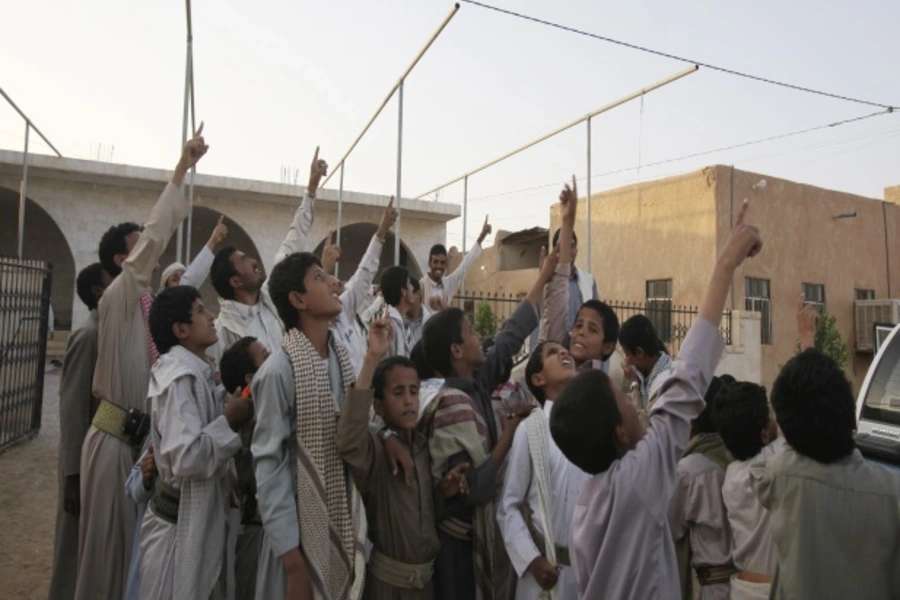You Might Have Missed: WMDs, Libya, and Drone Strikes in Yemen

More on:
- Peter Cynkar, “Opinion Briefing: Mexico’s Drug War,” Gallup, April 4, 2012.
Mexicans personally feel less safe in their own neighborhoods in 2011 than they did at the onset of the drug war. While perceptions about safety have fluctuated, the 42% who said they feel safe walking alone at night in 2011 is down 15 percentage points from 57% in 2007.
Mexicans’ trust in their local police has dropped substantially since the drug war began, to 35% in 2011 from 50% in 2007. This loss of faith may reflect the country’s ongoing security issues, as well as the removal of thousands of corrupt cops during Calderon’s crackdown. Mexico’s military replaced many of these police officers. Majorities of Mexicans have consistently expressed confidence in the country’s military in the same period, although confidence has edged lower over the years.
- CBC Television Interview with Secretary Panetta, April 2, 2012.
The fact is we are on the right track and the fact is we’ve got to stay committed there because in the end, you know, the American people, the Canadian people, the British people, people of the world, I think, understand that the lives we’ve lost there—and we’ve spilled a lot of blood there—that those lives cannot be lost in vain, that the whole goal here was to achieve an Afghanistan that could secure and govern itself, and that’s what we’ve got to stay focused on and that’s the mission we’ve got to accomplish.
(3PA: As of today, 1,919 U.S. soldiers have died in Operation Enduring Freedom.)
- Ken Dilanian and David S. Cloud, “In Yemen, Lines Blur as U.S. Steps Up Airstrikes,” Los Angeles Times, April 2, 2012.
As the pace quickens and the targets expand, however, the distinction may be blurring between operations targeting militants who want to attack Americans and those aimed at fighters seeking to overthrow the Yemeni government.
U.S. officials insist that they will not be drawn into a civil war and that they do not intend to put ground troops in Yemen other than trainers and small special operations units.
"We don’t want to become involved in the country’s internal battles," an Obama administration official said. "We don’t want to turn every antigovernment fighter against the United States."
- Elizabeth Dickinson, “Look Who’s Saving the World: BRICS Pump Up Foreign Aid,” March 26, 2012.
Between 2005 and 2010, Brazil and India grew their foreign aid spending by more than 20 percent. China and South Africa both upped their assistance by about 10 percent. Russia, which had increased its own spending earlier in the decade, now devotes about $500 million annually to development spending overseas.
Over the same period, the foreign aid budget of the United States grew just 1.6 percent.
- UN Security Council, Final Report of the Panel of Experts Concerning Libya, March 20, 2012.
NATO provided reports of inspection activities to the sanctions Committee on a regular basis. As at 31 October 2011, NATO had hailed 3,100 ships, boarded 300 and denied 11 vessels access to Libyan ports; no breach of the arms embargo was reported by NATO, however.
(3PA: To see NATO actively breach the arms embargo, watch this video, which was published by NATO.)
- Donna L. Hoyert, “75 Years of Mortality in the United States, 1935-2010,” Center for Disease Control, March 2012.
Although single year improvements in mortality were often small, the age-adjusted risk of dying dropped 60 percent from 1935 to 2010.
Heart disease, cancer, and stroke were among the five leading causes every year between 1935 and 2010.
- Director of National Intelligence, “Unclassified Report to Congress on the Acquisition of Technology Relating to Weapons of Mass Destruction and Advanced Conventional Munitions,” January 1-December 31, 2011.
During the reporting period, Iran continued to expand its nuclear infrastructure and continued uranium enrichment and activities related to its heavy water research reactor, despite multiple United Nations Security Council resolutions since late 2006 and most recently in June 2010 calling for suspension of these activities. Although Iran has made progress in expanding its nuclear infrastructure during 2011, some obstacles slowed progress during this period.
North Korea nuclear test activity in 2006 and 2009 strengthens our assessment that the North has produced nuclear weapons.
(3PA: It is remarkable that, after two tests in 2006 and 2009, the intelligence community still cannot definitively state that North Korea has nuclear weapons.)
More on:
 Online Store
Online Store